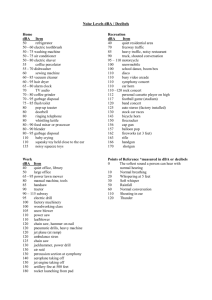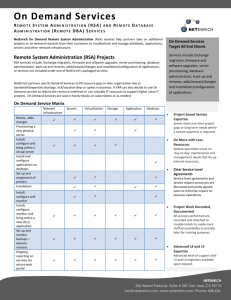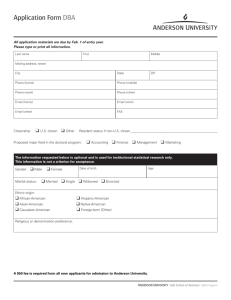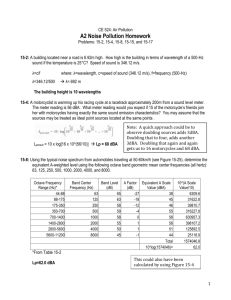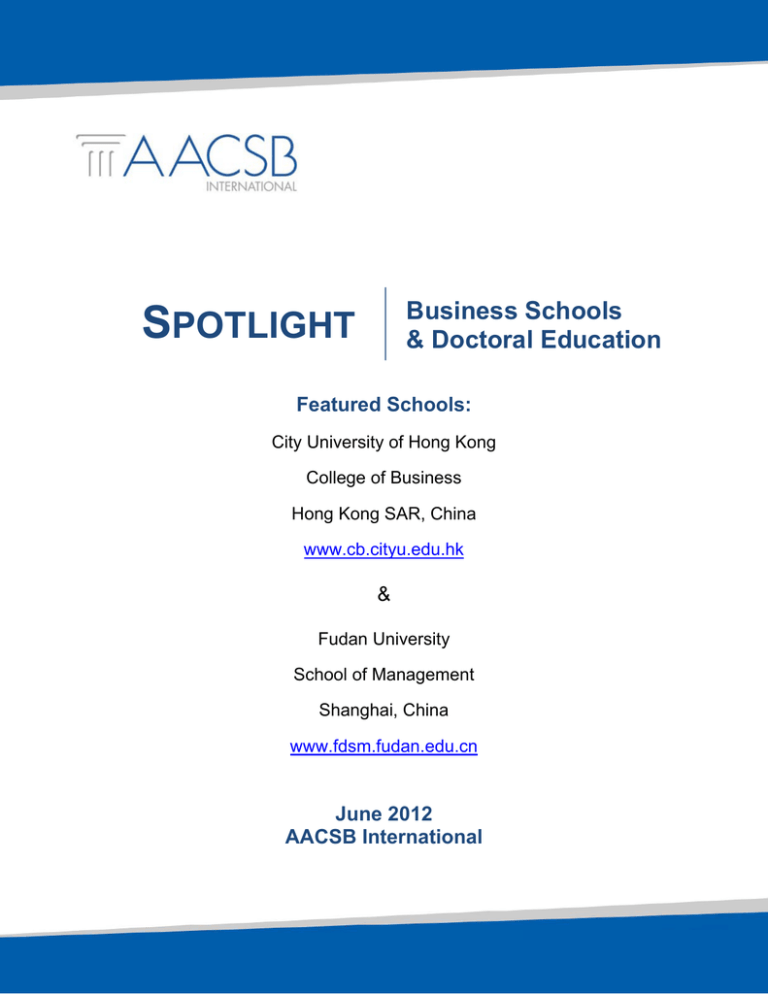
Business Schools
& Doctoral Education
SPOTLIGHT
Featured Schools:
City University of Hong Kong
College of Business
Hong Kong SAR, China
www.cb.cityu.edu.hk
&
Fudan University
School of Management
Shanghai, China
www.fdsm.fudan.edu.cn
June 2012
AACSB International
SPOTLIGHT | Business Schools & Doctoral Education
City University of Hong Kong/Fudan University | 2
The CityU-FudanU DBA Program
In China, applicants to Doctorate of Business Administration (DBA) programs look for practice-focused
doctoral education for various reasons, according to City University of Hong Kong’s DBA Program
Director, Professor Douglas Vogel, and Dr. Hao Gang, Assistant Dean and director of the College of
Business’ joint DBA Program with Fudan University. Some applicants see academia as a place to bring
their business experiences and observations to, a place to distill them into knowledge that can be shared
and passed on to others one day when they exit from their business careers, they say, and a doctoral
qualification aids in that aspiration. Others seek a platform to work within academia to do research on
systematic ways to resolve complex business problems, and for these candidates the degree itself is less
important than the understanding, insight, and knowledge of research methodology gained through a
DBA program. Applicants of the latter type are more common in Hong Kong, say Professor Vogel and Dr.
Hao, where many executives are already typically “degree-heavy,” but both types of students are rich in
experience and problem-driven.
Professor Vogel says that the College of Business developed its original DBA program about six years
ago, making it one of the first business schools in China to offer one. Compared to more traditional
doctoral degree offerings such as the PhD, he says, the DBA is a relative newcomer to the landscape of
Chinese management education. Data from AACSB International’s annual Business School
Questionnaire (BSQ) support this statement. The first two business schools in China to report offering a
DBA program on the BSQ, one of which was City University of Hong Kong, both began doing so in the
2006-07 academic year.1
The high popularity and growing demand for the DBA led to the College’s strategic decision, made
approximately two years ago, to expand its offering into mainland China. Serendipitously, at that same
time the School of Management at Fudan University in Shanghai was seeking to partner with a highly
respected institution to develop a rigorous program to meet a rising demand for further studies and
doctoral degrees from its large and growing body of distinguished alumni in business. In so doing it also
would expand its own offerings into the new dimension of management education that the DBA
represents in China. Dr. Hao says that Fudan’s School of Management and her College soon recognized
the compatibility of their interests, and subsequently were able to accomplish the set-up of their joint DBA
Program very quickly.
Program Structure
Aiding the effort to launch the joint CityU-FudanU DBA Program rapidly is the fact that its structure is
largely modeled on City University of Hong Kong’s previously existing DBA program, an arrangement
Professor Vogel refers to as “two programs under the same umbrella.” In both cases, the DBA programs
involve 27 credits’ worth of coursework, split about evenly between electives and the required portion of
© AACSB International. All Rights Reserved.
SPOTLIGHT | Business Schools & Doctoral Education
City University of Hong Kong/Fudan University | 3
the coursework, which includes three core courses on applied business research methods and two
residential workshops. The coursework portion is followed by the doctoral thesis, which is worth 30
credits.2,3
Both the original and joint DBA programs also make a point of getting students involved with faculty
mentors from the very beginning, to guide them through the programs’ “spiral learning approach.” Dr. Hao
explains this concept as an iterative, “just-in-time” approach to learning, which makes use of academic
mentors to progressively focus the students’ initial research ideas, arising from the problems encountered
in their own business practices and observations, into proposals of feasible doctoral research while they
complete their coursework. The process of defining the problem and identifying the approaches is always
centered around the problems, often complex and profound, the students bring with them and care most
about, she says. The intent is that as the process spirals up, the original broad ideas ascend into better
formulated ones.
In implementation, says Dr. Hao, the joint CityU-FudanU DBA has mentors from City University of Hong
Kong’s College of Business meet regularly with their students (sometimes in groups) for about the first
eight months or so of their coursework, until such time as their thesis proposals have been narrowed
down to appropriate levels of specificity and rigor. At that point, the College of Business mentors work
with their colleagues at Fudan University to finalize the selection of best-matched thesis supervisors for
each student, based on the advisors’ expertise and the students’ research direction(s).
Both schools put a great deal of effort into ensuring close communications between students and mentors
(and subsequent thesis supervisors) throughout the program. More than 90 percent of all DBA students in
the original program have successfully graduated with the degree, according to Professor Vogel, and the
first set of graduates of the joint CityU-FudanU DBA Program are expected next year. He credits the
spiral learning approach with a big role in the high retention rates. It allows mentors to head off any
unrealistic expectations of their students in a timely fashion, he says, as well as to intervene at the first
signs of frustration.
Where the joint DBA program really differs from the original is in the adaptations made to better fit the
needs of mainland Chinese students. For example, City University of Hong Kong’s original DBA is
conducted as a part-time program, with regular weekend class meetings every three to four weeks.4 By
contrast, says Dr. Hao, the joint CityU-FudanU DBA is run in an executive format, in order to better
accommodate the availability of the students, most of whom are CEOs, board chairs, or other senior
executives of large firms from all over China. They attend intensive four-day weekend courses once a
month, sometimes in Shanghai, sometimes in Hong Kong and sometimes in an on-site “mobile-class.”
Another important difference is that the original DBA program is conducted entirely in English, whereas
the joint DBA is primarily Mandarin-based, though supplemented by English.5 CityU-FudanU DBA
© AACSB International. All Rights Reserved.
SPOTLIGHT | Business Schools & Doctoral Education
City University of Hong Kong/Fudan University | 4
students are also expected to write their doctoral thesis in Chinese, though with abstracts in both
languages.6
Fulfilling Unmet Needs
Dr. Hao and Professor Vogel agree that the CityU-FudanU DBA, and for that matter the original DBA
program, were specifically designed to serve a very different target audience than a traditional PhD
program. In the context of Chinese management education, they say, PhD students are often younger,
less experienced, and more focused on careers in academia than in industry, as compared to their DBA
counterparts. By contrast, they note that the students of the joint DBA come to their program with an
average of 20 years’ work experience,7 but are typically less well-versed in important elements of
academic research, such as the value of a rigorous literature review, or the ability to put one’s own
perspectives on hold in order to make critical analyses.
As it happens, that disparity is the source of one of the CityU-FudanU DBA Program’s most intriguing
innovations. In addition to an academic mentor from each school, say Professor Vogel and Dr. Hao, each
joint DBA program student is also assigned a PhD student as a research assistant. The objective of this
practice is to give the PhD students exposure to the experience-shaped perspectives and practically
focused research problems of the DBA students, while allowing the DBA students to benefit from the PhD
students’ help in honing their academic research techniques.
Impact of the DBA in China
The joint CityU-FudanU DBA Program has had a number of positive results already, both for the two
participating universities and for their students. For example, the need for a greater volume of case
studies in the Chinese context is well known and widely lamented by business academics with research
interests in China. Because students are expected to come to the CityU-FudanU DBA Program with live
business problems that they wish to resolve through the research in the DBA, all the proposed doctoral
theses make excellent fodder for increasing the number of such cases, notes Dr. Hao.
The students themselves see significant benefit from their involvement in the DBA program. Those who
graduate will gain acceptance and credibility above and beyond the level of consultants or EMBA-holders
as people who can handle the most complex and nuanced problems for their employers, because they
will have proven their ability to apply the critical analysis skills they learn in the DBA, beyond their original
research problem. The research that the students do also resonates within their own business sector,
says Dr. Hao. She cites the example of one DBA student, whose research focuses on family businesses
in China and their evolution under the potential ‘genetic’ impact from Chinese culture and tradition that
may be subtle, but also could be profound. This student also happens to be the chair of an association of
Chinese family businesses, and as a result his research will be very meaningful to, and undoubtedly have
significant influence on, this sector of the Chinese economy.
© AACSB International. All Rights Reserved.
SPOTLIGHT | Business Schools & Doctoral Education
City University of Hong Kong/Fudan University | 5
Both Professor Vogel and Dr. Hao agree that the experience of running the joint DBA program has been
very positive for the two schools. Because of the system of including dual mentors for each student, the
program has expanded each school’s reach in their own learning and in providing their students with
enriched learning experiences. It has also increased the propensity for joint research projects.
Additionally, DBA student research tends to be much more interdisciplinary than that of PhD students,
they say, which promotes the interaction of academics in ways that might not otherwise be obvious.
Finally, having the program itself targeted at senior executives promotes the interaction of governmental,
business and academic sectors in ways that have beneficial impact for all concerned.
Acknowledgements: AACSB International is grateful for the assistance of Dr. Hao Gang, Assistant Dean
and Program Director of the CityU-FudanU DBA program, and Professor Douglas Vogel, Acting Head of
the Department of Management and DBA Program Director, both of City University of Hong Kong.
© AACSB International. All Rights Reserved.
SPOTLIGHT | Business Schools & Doctoral Education
City University of Hong Kong/Fudan University | 6
End Notes
1
AACSB International. (2011) Analysis of data from the AACSB 2010‐11 Business School Questionnaire (BSQ). City University of Hong Kong, College of Business. (2012) CityU DBA, Programme Structure web page. Electronic document, http://www.cb.cityu.edu.hk/dba/content.cfm?category=programme/structure, accessed May 15, 2012. 3
City University of Hong Kong, College of Business. (2012) CityU‐FudanU DBA, Programme Structure web page. Electronic document, http://www.cb.cityu.edu.hk/dba/fudan/?category=programme&page=structure, accessed May 15, 2012. 4
City University of Hong Kong, College of Business. (2012) CityU DBA, Coursework Component web page. Electronic document, http://www.cb.cityu.edu.hk/dba/content.cfm?category=programme/structure&page=coursework_component, accessed May 16, 2012. 5
City University of Hong Kong, College of Business. (2012) CityU‐FudanU DBA, Course Delivery web page. Electronic document, http://www.cb.cityu.edu.hk/dba/fudan/?category=programme&page=teaching_and_learning, accessed May 16, 2012. 6
City University of Hong Kong, College of Business. (2012) CityU‐FudanU DBA, Thesis Requirements web page. Electronic document, http://www.cb.cityu.edu.hk/dba/fudan/?category=programme&page=thesis, accessed May 16, 2012. 7
City University of Hong Kong, College of Business. (2012) CityU‐FudanU DBA, 2011 Student Profile web page. Electronic document, http://www.cb.cityu.edu.hk/dba/fudan/?category=programme&page=profile, accessed May 16, 2012. 2
© AACSB International. All Rights Reserved.

